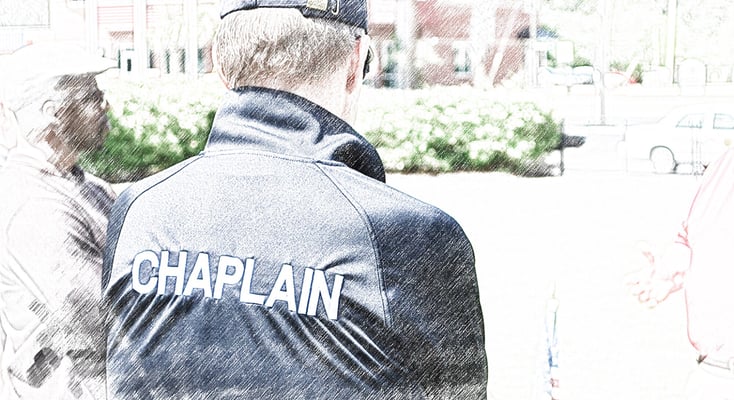Care Plans for Chaplains


A few months ago, I talked with a fire chief, and he told me about his chaplain program. This part of the state has several chaplains, so I wanted to hear his impressions and expectations.
Whenever there is a house fire, he told me he wanted his chaplain right there with his or her Bible. That was all. I was a little taken aback by this. Did he see chaplains as primarily there to share the gospel? After a second or two, I suggested some other possibilities. I told him that my heart for his chaplains is that they would be there with blankets, medical attention, food, water, and shelter to get victims out of the elements or away from the crowds, and a list of phone numbers to the Red Cross, churches, and other groups that can help long-term. After that, they might pray with the displaced family if it seemed appropriate.
Over the years, the faith community has been at odds with the psychological community, and for good reasons. But in this case, I think people of faith have something to learn from the likes of Abraham Maslow. He stated that we must take care of physiological needs long before we can start things like spiritual needs. In the case of a house fire, we need to make sure the family is safe and cared for and that their social contact needs are met before we address their eternal state (if it comes to that).
Chaplain, What Is Your Plan?
Chaplain, when you go on a 911 call, what is your care plan? Is this something you consider? First responders have a plan and work the plan on every call. They must take in the scene and adapt, but they never just “wing it,” and neither should you.
When I go out on a 911 call as a chaplain, I work through a care plan. This care plan varies depending on the type and nature of the call, but one of the first things I always do is ensure everyone is safe. If you are not part of the overall safety solution, you are a hindrance and will most likely be removed from the scene and never be called back.
What do you bring to the scene? What is your strategy to take care of the first responders? How can you take care of the needs of the public? Are you meeting Maslow’s lower needs so you have earned the right to address the higher ones?
A ministry of presence can be powerful, but do you realize that giving someone a cup of cold water at the right time can be just as powerful? What do you have to offer? What kind of training do you have to help fulfill your care plan? Here are some ideas.
Be aware enough of fire/police operations to help and stay in the way. Go to drills and trainings. Participate where you can. If you know where you belong and where you don't, your crews can pay more attention to the emergency and less to their chaplain.
Provide emergency scene support. Do you know how to fill air bottles or take a blood pressure? How about the myriad of forms and reports that come with this job? Do you know how to get the basic information so our first responders don't have to? These are often areas where new volunteers begin.
Be trained in CPR and first aid. There have been a number of times that I, as chaplain, have been drawn in to help do compressions. Again, saving the life is the priority. Then, if you can, address other needs.
Get training as an EMT (Emergency Medical Technician). You may not actually use it on scene, but it is a comfort for your crews to know that you can help if needed. Also, it allows you to understand better the scene and what your crews are going through. If they know you “get it,” they will more likely respect and discuss things with you. And you’ll be a more effective liaison to others trying to understand what’s happening if that’s appropriate.
Get training for MCI (Mass Casualty Incidents). When your department trains in mass casualty incidents, join them. Figure out your role and where you can better help them.
Finally, get training in critical incident stress management and dealing with the public.
There are things that the firefighters or police officers do not want to do or do not have time to do. Often, firefighters, especially, are men and women of action and less comfortable dealing with ambiguous and emotional things. Many first responders tell me that they are incredibly thankful when I take over caring for the family or can be the one who gives the death notice.
A New Mindset
As chaplains, we must change the mindset that we are just “pastors” here to preach or pray and become part of the overall response team. That can only happen if we act professionally, with something that fits into the overall incident response. Chaplaincy is very much a practical ministry. It requires boots on the ground and occasionally getting your hands dirty. It means getting practical training and building a strategy and care plan that fits the needs of each department and fits within the scope of the law as our positions as chaplains.
